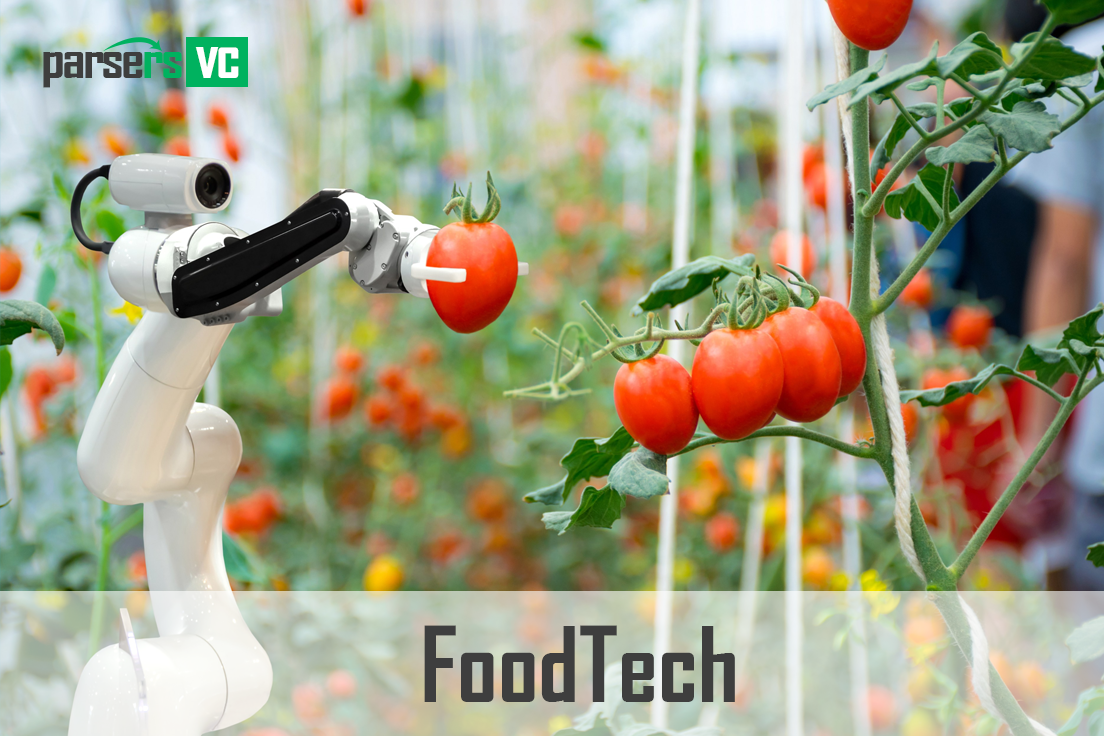Innovative food technology is just beginning to develop and could grow by 40 times the amount of investment. In this article about foodtech startups, we look at the food industry’s biggest challenges, the biggest deals in the industry, and the most promising trends.
Foodtech is the integration of digital technology in all areas that deal with food.
This industry couldn’t be newer in the 21st century, with a growing global population, production, consumption and pollution, plus epidemics and natural changes in our food habits. The global agri-food industry is adapting to a rapidly changing world. It is therefore striving to meet people’s needs for healthier and more sustainable food – and is actively investing in innovative projects and companies working in this field.
Foodtech stuffing
There is a perception that foodtech is only about delivering food or ready meals from restaurants, but it is much more global and broader than that. This sector of the economy consists of technology startups developing products and services. These startups are changing the traditional ways of finding, buying, delivering, preparing and consuming food.
These include:
– The introduction of sensors and software into farm management that optimize processes, increasing farm productivity and product quality;
– robots that replace or complement humans in complex jobs;
– production of alternatives to animal products;
– production of organic and natural products;
– environmentally friendly packaging (for example, cheap biodegradable alternatives);
– technologies to reduce and recycle food residues;
– sugar-free production of sugary foods;
– smart devices for the kitchen;
– recommendation services and applications for creating personalized diets, taking into account biomarkers, body features, and a person’s diet;
– gastronomic tourism services for new experiences;
– creation of functional products or ingredients;
– robotic delivery (drones, robots and autonomous food delivery vehicles);
– online marketplaces;
– dark-kitchens – delivery-only kitchens with no seating;
– urban and indoor farms that shorten the distance between production and consumption, increasing yields, quality, and sustainability.
Investments and investors
The market is growing very fast (50%-70% annually) and it is absolutely far from saturation. It is so large and diverse that many large competitors can perfectly coexist in different segments. Where there is a growing market – there is money, that is what attracts the investor in the first place. The biggest growing segment of the foodtech market is delivery.
During the pandemic, our lifestyles have changed, and there has been a boom in food delivery services or ready-to-eat meals. That is why such projects are now attracting the largest investments. Investors’ interest in foodtech is growing every year.
Some of these startups are already listed on the Nasdaq technology stock market in the US.
For example, Beyond Meat, a plant-based meat company, was financed by Bill Gates and Leonardo DiCaprio, among others.
From January to November 2021, there were 956 deals totaling $28.8 billion in the foodtech sector. This is almost three times more than during the same period in 2020. In the third quarter of 2021, there were 306 deals worth $10.1 billion in the foodtech sector. That’s a 217% increase over 2020. The number of deals increased 112%.
The most interesting foodtech deals of 2021
– Gorillas (Germany), which created a grocery delivery app, has raised $1 billion in investment. Since its inception in 2020, Gorillas has opened 180 warehouses and darkstores, from which groceries are delivered in 10 minutes. The company has begun expanding into the U.S.
– Nuro (U.S.), an electric car company, has raised $600 million in investment.
– Pivot Bio (USA) raised $430 million in investments. This biotech startup is a leading innovator in the field of nitrogen fertilizers. Pivot Bio offers an alternative to traditional synthetic fertilizers – a product created by programming microbes in the soil to produce more pure nitrogen.
– Perfect Day (USA) has raised $350 million in investment. The company creates real milk protein by fermenting sugar and uses genetically modified microflora. The production of this protein reduces greenhouse gas emissions by 97% as compared to traditional dairy products.
– Nature’s Fynd (USA), which grows sustainable protein from Yellowstone National Park’s geothermal microbes, has raised $350 million in investment. In essence, Nature’s Fynd creates meat analogs through microbial fermentation.
– Apeel (USA), which makes an edible coating for fruits and vegetables that increases shelf life, has raised $280 million in investment. The protective extra peel made from natural products retains moisture and keeps oxygen out. Fruits and vegetables stay fresh, nutritious and tasty twice as long.
Foodtech – the cause and solution of environmental problems
Despite all the innovation and visionaryism of foodtech, this direction not only solves, but also creates problems. For example, the growth of deliveries increases the amount of packaging produced and the carbon footprint. Disposable packaging thrown into landfills is a symbol of the environmental disaster of our time.
Most of us, when buying from an offline store or ordering online, don’t think about where all that plastic, cardboard, and glass will go. The burden of responsibility for all that junk is on three parties: manufacturers, marketplaces, and consumers.
The manufacturer should pack their goods in as environmentally friendly a container as possible that can easily be recycled. We are responsible for where all this trash, which is actually valuable recyclables, goes.
Microalgae as a new trend
The alternative protein market is becoming more diverse. In the first half of 2021, a new category of proteins – microalgae – attracted the attention of investors. They are rich in protein, fiber, and nutrients (vitamins, minerals, antioxidants, and essential fatty acids). By 2026, the global market for algae protein will reach $1 billion. Among the startups developing microalgae products, Qualitas Health ($18.5 million) and Algama ($8.3 million) received major venture capital investments in the first half of 2021.
Mushrooms in foodtech
They can save us from many problems, solve the most difficult problems and change the world. Mushrooms have many industrial applications: from the production of eco-friendly furniture and cosmetics to the recycling of garbage or use as alternative proteins in food. The main advantage of mushrooms is that they grow very quickly at minimal cost. And they fit perfectly into the global trend to replace animal products with plant-based ones. The main advantage of mushrooms is that they grow very quickly at minimal cost. And they fit perfectly into the global trend of replacing animal products with vegetable ones.
Mushrooms in foodtech can be applied in two cases:
1. Mycelium-based packaging will be cheap, safe for use with food, and suitable for composting. Even if such packaging does not go into compost, but simply into nature or landfill, it will decompose quickly, without harming the environment.
2. An analogue of animal food, rich in protein. Mushrooms have tremendous potential as a meaty textural component for vegan products or as substrates for growing cultured meat. For example, Mushlabs produces mushroom mycelium to create delicious and healthy raw ingredients for meat alternative products. Their mission is to produce nutritious and organic foods that both meat-eaters and vegetarians enjoy. This food system provides affordable food for all while preserving our planet.



